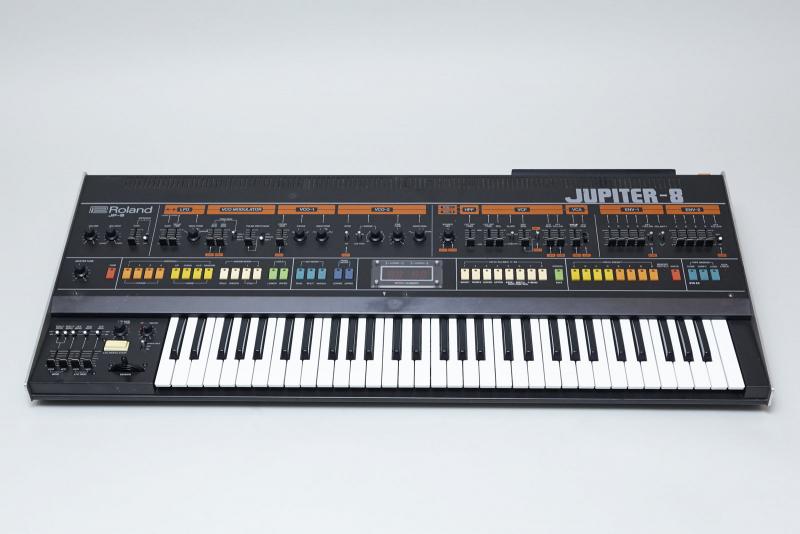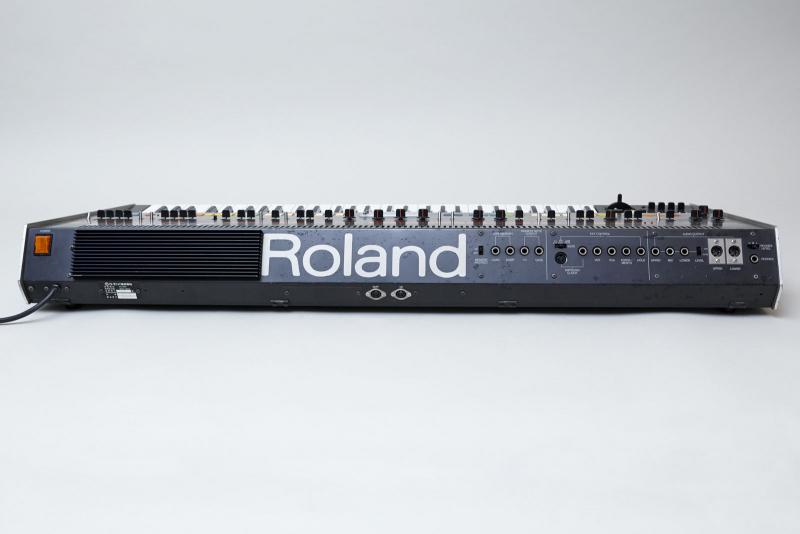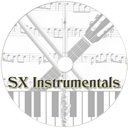Filter on ALL, SYNTH, DRUM, SAMPLER or MISC |
Total list currently 2405 items in 330 Brands |
Roland | Jupiter-8 |
Description | The Jupiter-8, or JP-8, is an eight-voice polyphonic analog subtractive synthesizer introduced by Roland Corporation in early 1981. The Jupiter-8 was Roland's flagship synthesizer for the first half of the 1980s. Although it lacked the soon-to-be standard of MIDI control, later model Jupiter-8s did include Roland's proprietary DCB interface, and all of them sported advanced features and the ability to split the keyboard into two zones, with a separate patch active on each zone. The Jupiter-8 is an 8-voice polyphonic analog synthesizer. Each voice features two VCOs with cross-modulation and sync, pulse-width modulation, a non-resonant high-pass filter, a resonant Low-pass filter with 2-pole (12 dB/octave) and 4-pole (24 dB/octave) settings, an LFO with variable waveforms and routings, and two envelope generators (one invertible). Features include adjustable polyphonic portamento and a Hold function for infinite sustain of notes and arpeggios. A versatile arpeggiator can be synchronized with external equipment by using the proprietary Roland DCB interface, clock input via CV jacks on the rear panel, or one of the aftermarket MIDI kits from Encore or Kenton. An assignable bender can be used to control pitch or filter frequency. From the factory, the JP-8 could store 64 patches. Patches could be stored to, or loaded from, a standard analog tape/cassette. The Encore JP8MK MIDI kit doubles the patch memory to 128 and enables the JP-8 to store and recall patches over a MIDI connection, using a computer with sysex utility software. The Jupiter-8 includes balanced stereo XLR outputs as well as unbalanced 1/4" outputs. In addition to monophonic and polyphonic modes, the Jupiter-8 includes a unison mode, in which all 16 oscillators can be stacked into a single monophonic patch. A Zilog Z80 CPU was used for managing storage of patches; scanning the keyboard and front-panel controls for changes; displaying the current patch number and other information on the display; and taking care of the auto-tune function, among other things. The VCOs were discrete. The VCF was based on the custom Roland IR3109 IC (also used in the filter circuits of the Jupiter-6, later Jupiter-4 units, MKS-80 rev 4, Juno-6/Juno-60, SH-101, MC-202, JX-3P and packaged in the 80017a chip used in the Juno-106 and MKS-30 among others). The VCA was the BA662, used also in Juno-6/60/106, JX-3P and TB-303. The envelopes were generated in hardware by the Roland IR3R01 chip (also in the Juno 6/60), and are much faster (1ms attack) than the software-generated envelopes used in the later Jupiter-6, Juno-106 and MKS-80 "Super Jupiter". |
| Brand | Roland |
| Model | Jupiter-8 |
| Device | Synth |
| Type | Keys |
| Engine Type | Analog |
| Engine | VCO |
| Voices (max) | 8 |
| Multitimbral | 2 |
| Oscillators | 2 |
| LFO | 4-waveform (sine, tri, ramp, random) LFO |
| Noise | Y |
| Engine Detailed | 2 VCO's per voice (16 oscillators's!) switchable between triangle, sawtooth, pulse, and square waves plus noise on OSC 2 |
| Filter (VCF) | Low pass filter with 2-pole (12 dB/oct) and 4-pole (24 dB/oct) modes, Env Mod, LFO MOd, Key Follow. Separate 6 dB/oct high pass filter. |
| Envelope (VCA) | Standard ADSR and mixer to balance oscillator levels |
| Memory | 64 patches and 8 patch presets |
| Keys | 61 |
| Key type | Keys |
| Velocity | N |
| Aftertouch | N |
| Midi | (via kit) |
| Extra info | DCB Roland to Roland sync/interface on some models |
| Produced: | 1981 - 1984 |
| Legend: | Obvious | Y: Yes, N: No, N/A: Not Applicable | |
| VCO | Voltage Controlled Oscillator | DCO | Digital Controlled Oscillator |
| LFO | Low Frequency Oscillator | Sub | Sub Oscillator |
| VCF | Voltage Controlled Filter | VCA | Voltage Controlled Amplifier |
| Velocity | As with a piano, the harder you hit a key, the louder the sound, unlike most organs which always produce the same loudness no matter how hard you hit a key. | Aftertouch | Pressing a key after you activated it. Channel Aftertouch, no matter which key, it will send a Channel message. Poly Aftertouch, sends the pressure per key instead of the whole channel. |
| Values for OSC, LFO, Filter, Envelope are per voice unless stated otherwise. | |||




